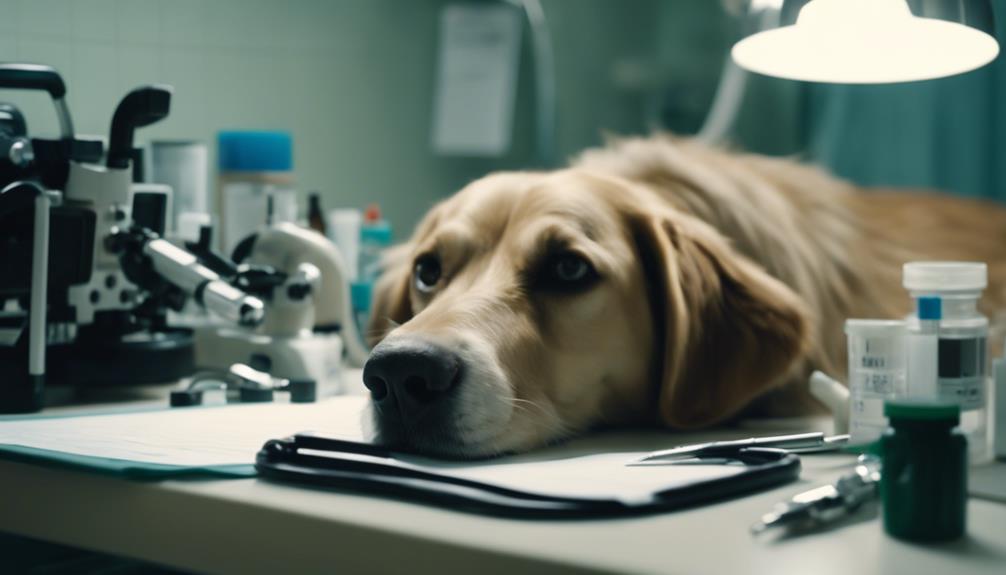Understanding the nuances of lethargy in dogs goes beyond recognizing a mere lack of energy. When your furry companion displays unusual tiredness, it prompts a deeper exploration into potential health issues that may be at play.
By unraveling the underlying reasons behind your pup's lethargy, you can equip yourself with the knowledge needed to provide optimal care and support for your canine friend.
Stay tuned to uncover the intricate web of factors that contribute to your dog feeling more dog-tired than usual.
Key Takeaways
- Lethargy in dogs is a sign of an underlying issue requiring veterinary attention.
- Recognize lethargy alongside symptoms like vomiting or poor appetite for prompt intervention.
- Severity of lethargy determines urgency; contact a vet immediately for unresponsive dogs.
- Veterinary care involves physical exams to diagnose and treat the cause of your dog's lethargy.
Lethargy: Understanding the Basics
When considering lethargy in dogs, it is essential to grasp the fundamental aspects that underlie this common symptom. Lethargy is characterized by a lack of energy and enthusiasm in dogs, leading to reduced activity levels and interest in their surroundings. This can manifest as a general sense of tiredness, sluggishness, or disinterest in usual activities such as playtime or eating.
While lethargy itself is not a specific disease, it serves as a crucial indicator of an underlying health issue that needs attention. Monitoring your dog's behavior closely and noting any changes in energy levels can aid in early detection and timely intervention, ultimately improving the overall well-being of your furry companion.
Signs and Symptoms to Watch For
Understanding the signs and symptoms to watch for is crucial in recognizing potential health issues in lethargic dogs. Lethargy in dogs may present alongside symptoms such as vomiting or diarrhea, indicating a possible underlying problem.
Additionally, poor appetite and weight loss can accompany lethargy, highlighting the need for prompt intervention. Observing lethargy as a sign of an issue is vital, and identifying other symptoms can aid in determining the root cause.
Timely veterinary assessment is essential to address any underlying health concerns effectively. By being vigilant of these signs and symptoms, dog owners can take the necessary steps to ensure their pet's well-being and seek appropriate medical attention when needed.
Assessing Your Dog's Lethargy

Assessment of your dog's lethargy is crucial in determining the severity of the situation and the necessary course of action for their well-being. When assessing your lethargic dog, consider the following:
- Observation: Watch your dog closely for any changes in behavior, appetite, or activity levels.
- Interaction: Engage with your dog to see if they respond differently than usual or show signs of discomfort.
- Physical Examination: Check for any visible signs of distress, pain, or unusual physical conditions.
When to Seek Veterinary Care
Seeking veterinary care promptly is crucial when your lethargic dog exhibits concerning symptoms or behaviors that indicate a potential underlying health issue. If your dog displays any of the following signs, it is advisable to contact your veterinarian without delay:
| Symptom | Description | Action |
|---|---|---|
| Vomiting | Persistent or bloody vomit | Immediate veterinary attention |
| Diarrhea | Frequent, watery stools | Consult a veterinarian |
| Difficulty Breathing | Labored breathing or panting excessively | Seek emergency care |
| Lethargy & Weakness | Unable to stand, lack of response | Immediate veterinary attention |
Monitoring these symptoms and acting promptly can help ensure the well-being of your furry companion.
Diagnostic Process and Treatment Options

The diagnostic process for identifying the cause of lethargy in dogs involves a thorough evaluation by a veterinarian to determine appropriate treatment options. When faced with a lethargic pup, understanding the steps in the diagnostic process can help address the issue effectively:
- Anxiety: Waiting for test results can be nerve-wracking for pet owners, but trust in the veterinarian's expertise is crucial for the best outcome.
- Hope: Discovering the underlying cause of lethargy brings hope for targeted treatment and a speedy recovery for your beloved dog.
- Relief: Upon receiving a treatment plan from the vet, a sense of relief washes over owners, knowing that their furry friend is on the path to wellness.
Handling Chronic Conditions in Dogs
Chronic conditions in dogs require diligent management and ongoing veterinary care to ensure the well-being and quality of life of the affected canine companions. When dealing with chronic illnesses in dogs, it is essential to establish a structured care plan in collaboration with your veterinarian. Regular check-ups, monitoring, and adherence to prescribed treatments are crucial for managing these conditions effectively. Here is a helpful table outlining key aspects of handling chronic conditions in dogs:
| Chronic Conditions Care Tips | Description |
|---|---|
| Regular Vet Visits | Scheduled check-ups for monitoring and adjustments. |
| Medication Adherence | Strict adherence to prescribed medications and treatment plans. |
| Dietary Considerations | Specialized diets tailored to the dog's condition. |
| Exercise and Activity | Appropriate physical activity levels to suit the dog's health needs. |
Importance of Timely Intervention

Prompt intervention plays a crucial role in addressing health issues in dogs exhibiting signs of lethargy. Timely action can significantly impact the outcome for your furry companion. Here are three reasons why swift intervention is vital:
- Early Detection: Detecting and addressing the underlying cause promptly can prevent the condition from worsening.
- Improved Prognosis: Timely intervention increases the chances of successful treatment and a faster recovery for your dog.
- Enhanced Quality of Life: Acting quickly can alleviate discomfort for your pet and improve their overall well-being.
Supporting Your Lethargic Pup
Addressing signs of lethargy in your dog promptly is essential for providing the necessary support and improving their overall well-being. When your furry companion is experiencing lethargy, it's crucial to offer them the care they need. Here are some ways to support your lethargic pup:
| Supportive Measures | Description |
|---|---|
| Comfortable Environment | Ensure a cozy and quiet space for your dog to rest. |
| Hydration | Keep fresh water available at all times to prevent dehydration. |
| Gentle Exercise | Engage in light activities to stimulate circulation and prevent stiffness. |
| Nutritious Diet | Offer high-quality, easily digestible food to support recovery. |
Preventive Measures for Canine Health

Implementing preventive measures is key to maintaining optimal canine health and well-being. To ensure your furry friend stays healthy and happy, consider the following:
- Regular Veterinary Check-ups: Schedule annual check-ups to detect any health issues early on and provide timely interventions.
- Balanced Nutrition: Feed your dog a well-balanced diet to support their overall health and immune system, reducing the risk of various illnesses.
- Adequate Exercise: Regular exercise helps maintain your dog's weight, muscle tone, and mental well-being, contributing to a healthy and active lifestyle.
Resources for Pet Wellness
For comprehensive information on maintaining pet wellness, explore trusted resources that offer valuable insights into enhancing your furry companion's health and happiness. These resources can include reputable websites such as the American Veterinary Medical Association (AVMA), the American Kennel Club (AKC), and the American Society for the Prevention of Cruelty to Animals (ASPCA).
These platforms provide a wealth of knowledge on topics ranging from nutrition and exercise to common health issues and preventive care. Additionally, consulting with your veterinarian for personalized advice tailored to your pet's specific needs is crucial in ensuring their overall well-being.
Conclusion
In conclusion, understanding lethargy in dogs is essential for pet owners to recognize potential health concerns and provide timely veterinary care.
By observing signs and symptoms, assessing the severity of lethargy, and seeking professional help when needed, pet parents can ensure the well-being of their furry companions.
Through proactive measures, including preventive care and supportive interventions, managing a lethargic dog can lead to improved overall canine health and quality of life.




